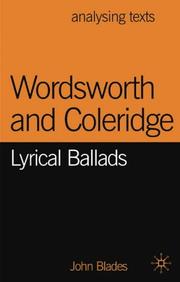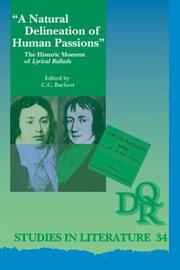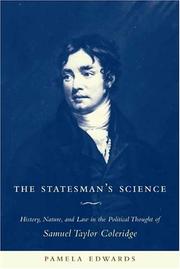| Listing 1 - 3 of 3 |
Sort by
|

ISBN: 1403904804 Year: 2004 Publisher: Basingstoke Palgrave
Abstract | Keywords | Export | Availability | Bookmark
 Loading...
Loading...Choose an application
- Reference Manager
- EndNote
- RefWorks (Direct export to RefWorks)
English poetry --- Romanticism --- History and criticism --- Coleridge, Samuel Taylor, --- Wordsworth, William, --- Criticism and interpretation.

ISBN: 9042008091 9004334483 Year: 2004 Publisher: Amsterdam ; New York : Rodopi,
Abstract | Keywords | Export | Availability | Bookmark
 Loading...
Loading...Choose an application
- Reference Manager
- EndNote
- RefWorks (Direct export to RefWorks)
Most of the articles in A Natural Delineation of Human Passions” originated in the Twelfth October Conference held in Leiden to celebrate the bicentenary of the publication of Lyrical Ballads. The first article, by the editor, “An Historic Moment: ‘A Natural Delineation of Human Passions’ as a ‘New Morality’?”, attempts to establish an historic and an historical context, both personal and political, for the six articles that follow, by Åke Bergvall, Myra Cottingham, C.P. Seabrook Wilkinson, James McGonigal, Jacqueline Schoemaker, and Suzanne E. Webster, which consider the themes of vagrancy and wandering in Lyrical Ballads, the expression of loss and compensation, and the consequences, both beneficial and perilous, for the language and rhetoric of poetry. Then three articles, by Annemarie Estor, Daniel Sanjiv Roberts, and Paul E.A. van Gestel, consider the ambience of science and philosophy in which Wordsworth and Coleridge strove to affirm the creative participation of poetry. After this, Jacqueline M. Labbe, Titus P. Bicknell, Robert Druce, and M. Van Wyk Smith discuss the parallel contributions of some of the more neglected contemporaries of the authors of Lyrical Ballads, not necessarily in English nor necessarily in England – Mary Robinson, Walter Savage Landor, Robert Bloomfield and Thomas Pringle. The volume concludes with an extended examination by Timothy Webb of the responses, both admiring and scornful, of the younger generation of Romantics to the legacy of Lyrical Ballads.
Wordsworth, William --- Congresses --- English poetry --- English poetry. --- Romanticism. --- Pseudo-romanticism --- Romanticism in literature --- Aesthetics --- Fiction --- History and criticism. --- Wordsworth, William, --- Coleridge, Samuel Taylor, --- Coleridge, S. T. --- Kolʹridzh, Samuil, --- Kolʹridzh, Samuil Teĭlor, --- Kūlīridj, Ṣāmwīl Tīlūr, --- Kūlīridzh, Ṣāmwīl Tīlūr, --- Кольридж, Самуил, --- Кольридж, Самуил Тейлор, --- קולרידג׳, סמיואל טיילור --- كولردج، صمويل تيلور, --- קאָלרידש, ס. ט., --- Criticism and interpretation. --- Lyrical ballads (Wordsworth, William) --- Lyrical ballads (Coleridge, Samuel Taylor) --- Wordsworth and Coleridge (Wordsworth, William) --- 1800-1899 --- England. --- Angleterre --- Anglii͡ --- Anglija --- Engeland --- Inghilterra --- Inglaterra --- Literary movements --- English literature

ISBN: 023150652X 9780231506526 9780231131780 023113178X 9780231131797 0231131798 Year: 2004 Publisher: New York : Columbia University Press,
Abstract | Keywords | Export | Availability | Bookmark
 Loading...
Loading...Choose an application
- Reference Manager
- EndNote
- RefWorks (Direct export to RefWorks)
Author of "Kubla Khan" and the epic "The Rime of the Ancient Mariner," Samuel Taylor Coleridge is remembered principally for his contributions as a romantic poet. This innovative reconsideration of Coleridge's thought and career not only demonstrates his importance as a philosopher but also recovers romanticism as both an aesthetic and a political movement. Pamela Edwards radically departs from classic theories of Coleridge's development and reads his writing within the framework of a constantly shifting political and social landscape. Drawing on the ideology, rhetoric, and institutional theory at the turn of the late British Enlightenment, Edwards unearths the fundamental continuities in Coleridge's writing during the revolutionary period of 1794 to 1834, paying particular attention to the rhetoric of Coleridge's pamphlet and miscellaneous writings, the journalism of the Napoleonic years, his philosophical and ultimately political treatises within the contexts of his notebooks and letters, and his readings and intellectual friendships. What emerges is a clearer understanding of Coleridge's political philosophy and his contributions to the origins and ideology of British Liberalism. Coleridge's interest in history, nature, and law as inherently interconnected projects producing an ideal or scientific reading of society reveals a developed progressive social and cultural state theory anchored in individual conscience, moral autonomy, and a civic and participatory human agency. If the Statesman could understand and finally master this scientific view of the world, he would be able not only to adjust political and social institutions to comprehend the historical contingencies of the moment but to see through the problem of the moment to the dynamic of change itself.
Political science --- History --- Coleridge, Samuel Taylor, --- Coleridge, S. T. --- Kolʹridzh, Samuil, --- Кольридж, Самуил, --- Kolʹridzh, Samuil Teĭlor, --- Кольридж, Самуил Тейлор, --- Kūlīridzh, Ṣāmwīl Tīlūr, --- קולרידג׳, סמיואל טיילור --- Kūlīridj, Ṣāmwīl Tīlūr, --- كولردج، صمويل تيلور, --- קאָלרידש, ס. ט., --- Political and social views. --- Knowledge --- Natural history. --- History. --- Law.
| Listing 1 - 3 of 3 |
Sort by
|

 Search
Search Feedback
Feedback About UniCat
About UniCat  Help
Help News
News